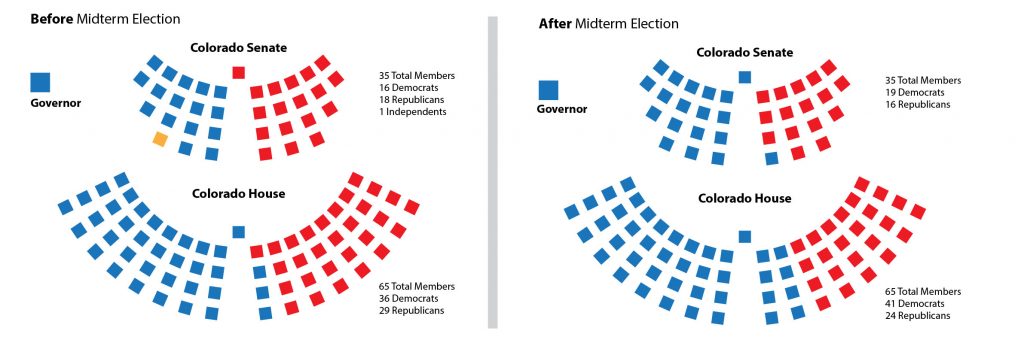By Jennifer Goodrum, CDA Director of Government Relations
From the Winter 2019 Journal of the Colorado Dental Association
A major “blue wave” was the headline of Colorado’s 2018 election results, with Democrats claiming notable victories across national, statewide and local races. In spite of this blue wave, Colorado upheld its fiscally conservative disposition, with nearly all statewide ballot initiatives with potential fiscal impacts failing.
At the national level, the U.S. House shifted majority from Republican (R) to Democrat (D), though the U.S. Senate retains Republican control. Colorado’s U.S. House members also shifted from a majority of Republicans (previously 5R-4D) to a majority of Democrats (now 5D-4R), with Jason Crow taking Republican Congressman Mike Coffman’s 6th congressional district seat. Colorado’s U.S. senators were not up for election this cycle and remain split, with one of each party affiliation. Joe Neguse, a Democrat from Colorado’s 2nd congressional district, is also new to the delegations—taking over Jared Polis’ former seat as the youngest member of Colorado’s federal delegation.
At the state level, Democrats swept all of Colorado’s statewide offices, including governor, the state Senate and the state House of Representatives. Former U.S. Congressman Jared Polis (D) took the Colorado governor’s seat, putting legislative control of all three facets of state policymaking under a single party for the first time since 1970. It was 1936 when the Democrats last held single party control of our state process. The Colorado state Senate changed majority from a one-vote Republican majority to a 19D-16R split, which is a solid Democrat majority. The Colorado House will remain Democrat controlled, and the Democrat majority grew substantially. Democrats won 41 races to the Republicans 24, giving Democrats nearly a super-majority in the Colorado House. This new paradigm of progressive Democrat leadership will ensure an interesting 2019 session. The state budget is expected to be the primary constraint on policy agendas, though incoming Governor Polis could also play a role as a very independent thinker. The Colorado Dental Political Action Committee (CODPAC) performed very well in state races this cycle, selecting a winning candidate in 96% of the races it participated in.
Following the election, the CDA Government Relations Council met to determine priorities for the upcoming 2019 state legislative cycle. The top three priorities selected by the council included:
- Raising the Medicaid Adult Dental Cap
Medicaid dental coverage has played a huge role in improving lives and health across the state. Currently, the program provides adults on Medicaid up to $1,000 annually for dental services but this cap is often insufficient to restore patients’ mouths to baseline, maintainable health. - Senior Dental Care Rate Restructure
Program participation and oversight should be made more efficient. Efforts will focus on creating the best policy and shoring up funding to cover more seniors through the benefit. - Opioid Prescribing
Additional efforts to address the state and nationwide opioid crisis are expected to arise again this session, especially given the new leadership of the state legislature. Like the federal policy recently passed by the U.S. Congress, discussion around e-prescribing for all patients is expected. The CDA will engage to ensure that any adopted policy fully accounts for the unique constraints of dental technology and practice.
The council identified several additional priorities for future action, which included implementing school dental screenings, addressing proposed rate decreases for sealants, conducting a non-substantive reorder of the Dental Practice Act, addressing supervision rules for Silver Diamine Fluoride/SDF, and extending preceptor tax credits.
The CDA 2019 State Lobby Day, when dentists meet at the Capitol to advocate for dental priorities, is set for the morning of Feb. 15, 2019. Please mark your calendar. Email Kelsey Creehan with interest, kelsey@cdaonline.org. The CDA will continue to provide updates regarding the upcoming legislative session and CDA advocacy developments.



